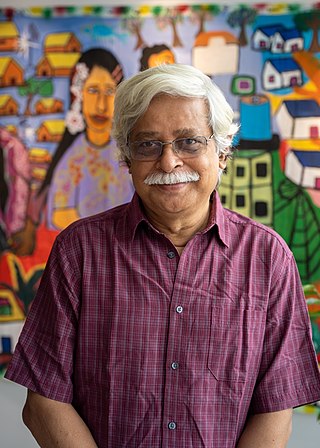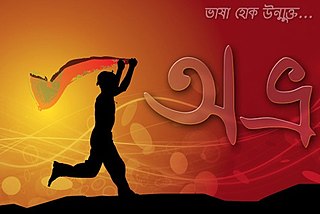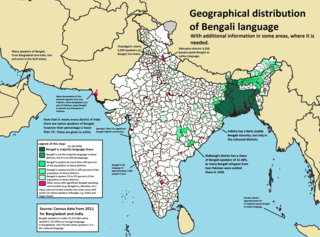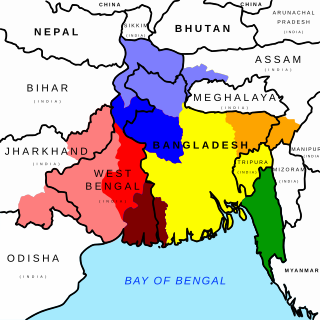Related Research Articles

Taglish or Englog is code-switching and/or code-mixing in the use of Tagalog and English, the most common languages of the Philippines. The words Taglish and Englog are portmanteaus of the words Tagalog and English. The earliest use of the word Taglish dates back to 1973, while the less common form Tanglish is recorded from 1999.

Biman Bangladesh Airlines, commonly known as Biman, is the national flag carrier of Bangladesh. With its main hub at Hazrat Shahjalal International Airport in Dhaka, the airline also operates flights from its secondary hubs at Shah Amanat International Airport in Chittagong and as well as Osmani International Airport in Sylhet. The airline provides international passenger and cargo services to multiple destinations and has air service agreements in 42 countries. The headquarters of the airline, Balaka Bhaban, is located in Kurmitola, in the northern part of Dhaka. Annual Hajj flights, transporting tourists, migrants, and non-resident Bangladeshi workers and the activities of its subsidiaries form an integral part of the corporate business of the airline. Bangladesh's air transport sector, which is experiencing an 8% annual growth rate thanks to a large number of outbound tourists, domestic tourists, and non-resident Bangladeshi travellers, is very competitive with stiff competition among some private Bangladeshi airlines as well as Biman.

Sylheti is an Indo-Aryan language spoken by an estimated 11 million people, primarily in the Sylhet Division of Bangladesh, Barak Valley of Assam, and northern parts of Tripura in India. Besides, there are substantial numbers of Sylheti speakers in the Indian states of Meghalaya, Manipur and Nagaland. as well as diaspora communities in the United Kingdom, the United States, Canada and the Middle East.

The Bengali language movement was a political movement in former East Bengal in 1952, advocating the recognition of the Bengali language as a co-lingua franca of the then-Dominion of Pakistan to allow its use in government affairs, the continuation of its use as a medium of education, its use in media, currency and stamps, and to maintain its writing in the Bengali alphabet / Bengali script

Muhammed Zafar Iqbal is a Bangladeshi science fiction author, physicist, academic, activist, former professor of computer science and engineering, and former head of the department of Electrical and Electronic Engineering (EEE) at Shahjalal University of Science and Technology (SUST). He achieved his PhD from University of Washington. After working 18 years as a scientist at California Institute of Technology and Bell Communications Research, he returned to Bangladesh and joined Shahjalal University of Science and Technology as a professor of Computer Science and Engineering. He retired from his teaching profession in October 2018. He is considered one of Bangladesh's top science fiction writers.

Bengalis, also rendered as endonym Bangalee, are an Indo-Aryan ethnolinguistic group originating from and culturally affiliated with the Bengal region of South Asia. The population is divided between the sovereign country Bangladesh and the Indian regions of West Bengal, Tripura, Barak Valley, Goalpara, Andaman and Nicobar Islands, and parts of Meghalaya, Manipur and Jharkhand. Most speak Bengali, a language from the Indo-Aryan language family. Sub-section 2 of Article 6 of the Constitution of Bangladesh states, "The people of Bangladesh shall be known as Bengalis as a nation and as Bangladeshis as citizens."

ATN Bangla, 'ATN' being the acronym of the unused Asian Television Network, is a Bangladeshi Bengali-language satellite and cable television channel owned by Multimedia Production Company. It is based in the Kawran Bazar neighborhood of Dhaka. ATN Bangla is the first privately owned television channel and the first to broadcast on satellite in Bangladesh. The channel began broadcasting on 15 July 1997. ATN Bangla is broadcast in over 130 countries worldwide.
Indian English has developed a number of dialects, distinct from the General/Standard Indian English that educators have attempted to establish and institutionalise, and it is possible to distinguish a person's sociolinguistic background from the dialect that they employ. These dialects are influenced by the different languages that different sections of the country also speak, side by side with English. The dialects can differ markedly in their phonology, to the point that two speakers using two different dialects can find each other's accents mutually unintelligible.

Avro Keyboard is a free and open source graphical keyboard software developed by OmicronLab for the Microsoft Windows, Linux, MacOS, and several other software additionally adapted its phonetic layout for Android and iOS operating system. It is the first free Unicode and ANSI compliant Bengali keyboard interface for Windows. It was published on 26 March 2003.

Television is one of the most popular forms of media and information in Bangladesh. It was one of the first countries in South Asia to introduce television on 25 December 1964, in the then East Pakistan under the state-owned television network Pakistan Television Corporation in its capital, Dhaka. After the Bangladesh Liberation War in 1971, the Dhaka television station of PTV was renamed to Bangladesh Television, which had a monopoly on the country's television industry until 1997, with the launch of ATN Bangla on satellite television. Since then, the number of privately owned television channels saw a tremendous rise in the Bangladeshi television market.

Bengali, also known by its endonym Bangla, is a classical Indo-Aryan language from the Indo-European language family native to the Bengal region of South Asia. With over 237 million native speakers and another 41 million as second language speakers as of 2024, Bengali is the fifth most spoken native language and the seventh most spoken language by the total number of speakers in the world. It is the fifth most spoken Indo-European language.

Bangladeshis are the citizens and nationals of Bangladesh, a South Asian country centred on the transnational historical region of Bengal along the eponymous bay.

The University of Dhaka also known as Dhaka University or DU is a public research university located in Dhaka, Bangladesh. Established in 1921, it is the oldest active university in Bangladesh.
Malaun is a derogatory religious slur for Bengali Hindus and Hindus in general, most commonly used by Bengali Muslims in Bangladesh. The word is derived from the Arabic "ملعون", meaning "accursed" or "deprived of God's Mercy".

The national symbols of Bangladesh consist of symbols to represent Bangladeshi traditions and ideals that reflect the different aspects of the cultural life and history. Bangladesh has several official national symbols including a historic document, a flag, an emblem, an anthem, memorial towers as well as several national heroes. There are also several other symbols including the national animal, bird, flower, instrument and tree.
Bangladeshi English is an English dialect heavily influenced by the Bengali language and its dialects in Bangladesh. This variety is very common among Bengalis from Bangladesh.
Urdish, Urglish or Urdunglish, a portmanteau of the words Urdu and English, is the macaronic hybrid use of South Asian English and Standard Urdu. In the context of spoken language, it involves code-switching between these languages whereby they are freely interchanged within a sentence or between sentences. In Pakistan and India, many bilingual or multi-lingual Urdu speakers, being familiar with both Urdu and English, display translanguaging in certain localities and between certain social groups.
Dobhashi is a neologism used to refer to a historical register of the Bengali language which borrowed extensively, in all aspects, from Arabic and Persian. It became the most customary form for composing puthi poetry predominantly using the traditional Bengali alphabet. However, Dobhashi literature was produced in the modified Arabic scripts of Chittagong and Nadia. The standardisation of the modern Bengali language during the colonial period, eventually led to its decline.
In Bangladeshi humour, Murad Takla refers to someone who writes Bengali words using the Latin script in a bizarre or unorthodox fashion, which unintentionally produces a distorted meaning. The phrase originated in the 2010s.
References
- ↑ Coleman, Julie (2014-01-10). Global English Slang: Methodologies and Perspectives. Routledge. ISBN 978-1-317-93476-9.
- ↑ Tahereen 2016.
- ↑ Lambert, James. 2018. A multitude of ‘lishes’: The nomenclature of hybridity. English World-wide, 39(1): 22. DOI: 10.1075/eww.38.3.04lam
- ↑ Sishir Bhattacharya, 2010 Benglish Verbs: a Case of Code-Mixing in Bengali PACLIC 24 Proceedings
- ↑ Kundu, Subhash Chandra, 2012 Automatic detection of English words in Benglish text: A statistical approach 2012 4th International Conference on Intelligent Human Computer Interaction (IHCI)
- ↑ Hunting Elusive English in Hinglish and Benglish Text: Unfolding Challenges and Remedies, Centre for Development of Advanced Computing (CDAC)
- ↑ "Bangladesh bans 'Banglish' to protect local tongue". The Express Tribune. Agence France-Presse. 17 February 2012. Archived from the original on 8 August 2018. Retrieved 23 November 2015.
- ↑ "ন্যক্বারজনক 'বাংলিশ' নিষিদ্ধ করল হাইকোর্ট – DW – 17.02.2012". dw.com (in Bengali). Retrieved 2024-02-23.